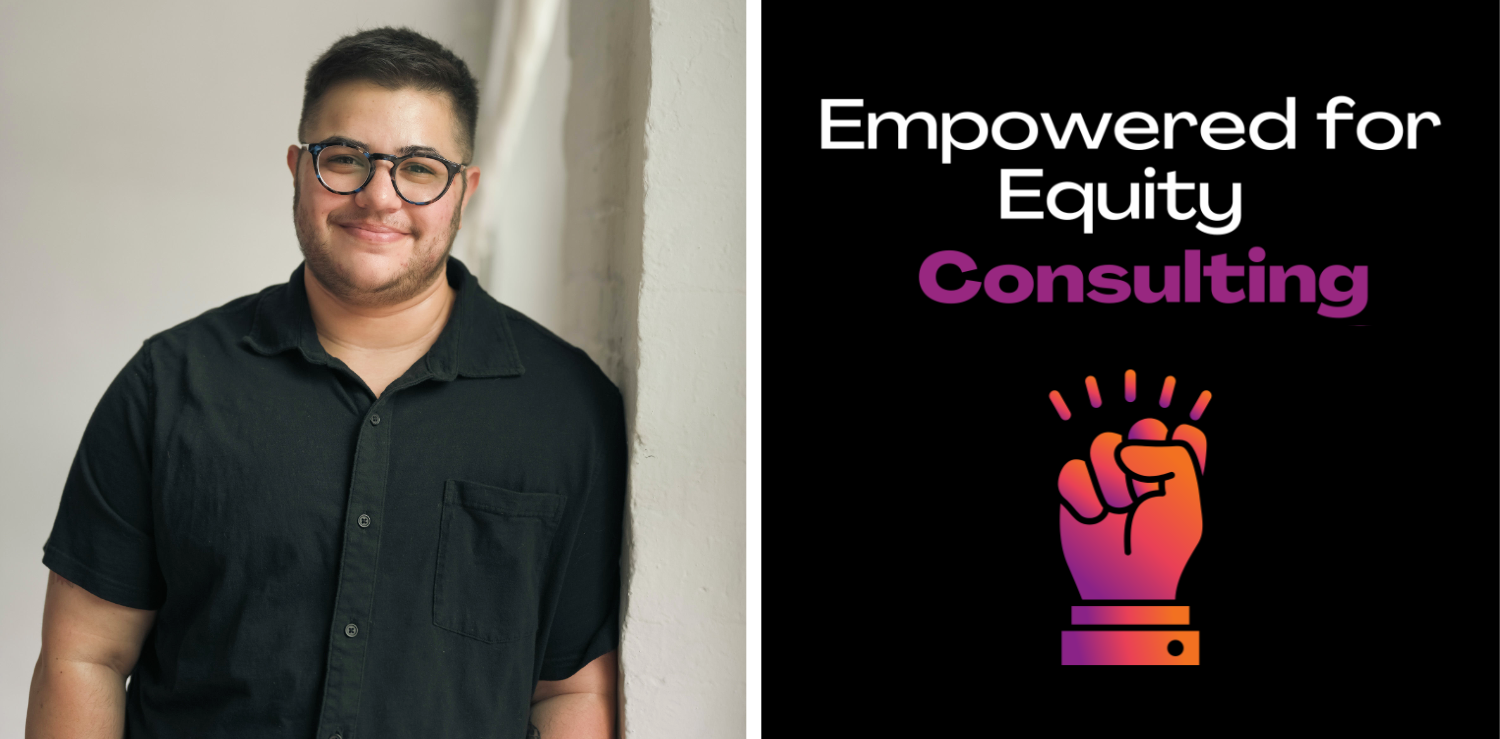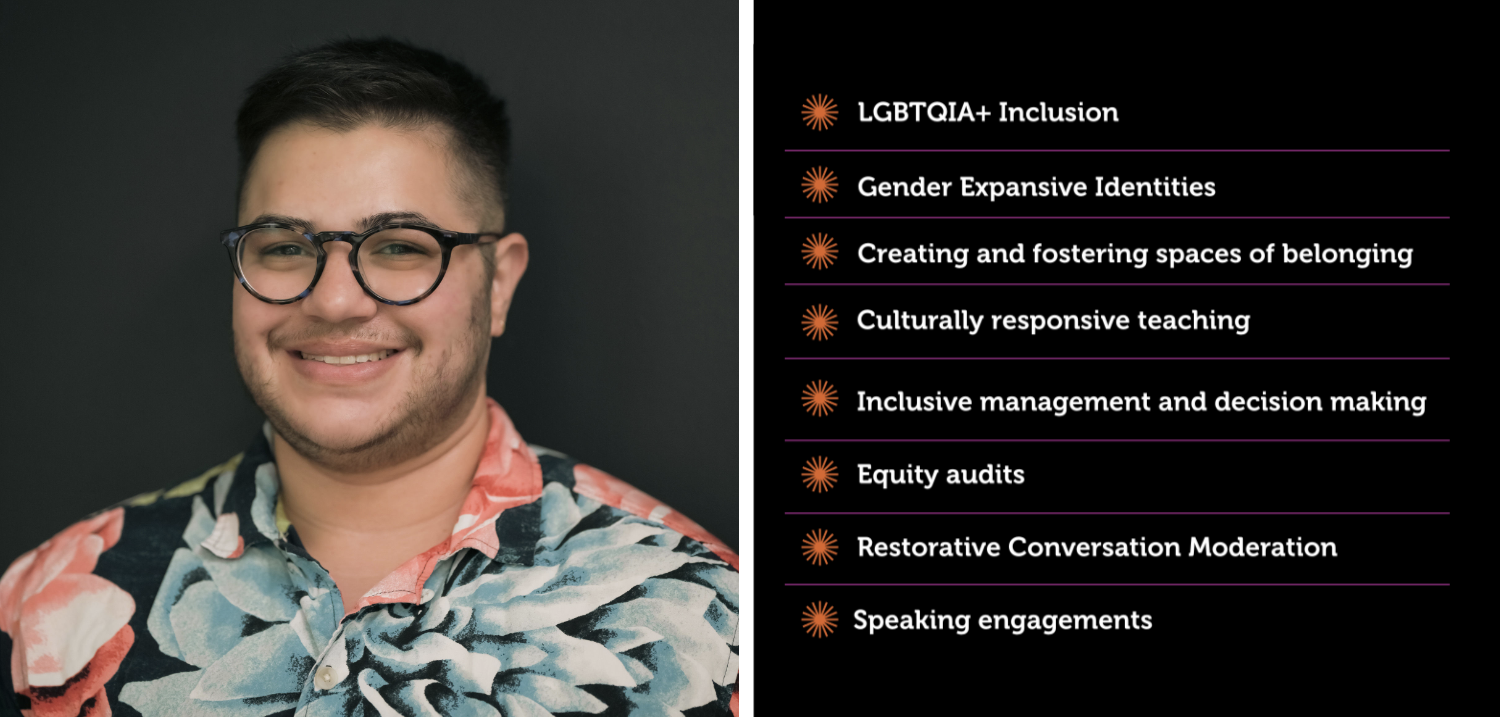Founder Interview With SJ Janjua, Empowered for Equity
Photo Credit: Empowered for Equity
Empowered for Equity Consulting, established in June 2023 by SJ Janjua, stands out for its dedication to advancing diversity, equity, inclusion, and belonging (DEIB) within educational and organizational frameworks. SJ, with a background in education coupled with a master's degree in International Education, infuses Empowered for Equity with rich insights drawn from their journey as a queer, transgender, non-binary, and biracial individual. Their transition from teaching English and creating educational programs to specializing in DEIB initiatives, showcases a deep commitment to fostering understanding and change.
During our interview, SJ dives into their professional journey, highlighting the challenges and growth that inspired them to start Empowered for Equity. Their story is a testament to resilience, dedication, and the drive to make a lasting impact in the realm of DEIB. From navigating the complexities of initially being out and then having to conceal their identity in a conservative work environment, to tackling DEIB work in today's politically charged climate, SJ's journey is inspirational and full of insights. They discuss the motivation behind their services, the hurdles they've overcome, and the advice they offer to future LGBTQ+ service providers, all while emphasizing the importance of self-care and setting boundaries in this challenging yet rewarding field.
1. Can you walk us through your professional journey and how you got to where you are today?
My journey has been a winding one, with lots of pit stops, bumps in the road, and missed exits — which is hilarious and a reminder that life always has a plan for us, even for someone who is very type A. My passion for literature and education was evident early on. I was always lost in a book as a kid and even made a hobby of reading the dictionary for fun. I knew I always wanted to pursue education and ended up starting my career as an English teacher. I understood the power of education, and it intrigued me. However, once I started, I soon understood all of the gripes I had heard about it. “Teachers don’t make any money!” “Those who can’t do, teach.” “You’re a saint, I can’t imagine working with teenagers.” It was challenging in all of the ways I anticipated and challenging in many ways I didn’t anticipate. I didn’t realize the mental toll it would take on me and just how thankless of a job it could be. I came out as queer right before I started teaching and quickly learned I’d need to go back into the closet, at least professionally, as soon as I started. I saw so many of my students grappling with their own identities, and I was never able to comfort them or talk to them about something I had also gone through. It was extremely difficult but I knew being out in a conservative state would cost me my job. After a few years of teaching, I ended up leaving the classroom, but knowing that teacher would always be a part of my identity.
From there, I pursued my master’s degree in International Education which led me to Tanzania, where I developed educational programs. Afterward, I came back to the United States, just before COVID-19 took the world by storm, and started working for a non-profit that runs after school programs. The pandemic gave me time to reflect on my gender identity, which I was already thinking about before I left for Tanzania. Pretty quickly, I came out as non-binary, changed my name and my pronouns socially, and felt a huge weight lift off my shoulders.
That spring, George Floyd was murdered, and the racial reckoning started. I had been doing my own self-work to unlearn white supremacy culture, ableism, the model minority myth, and other aspects of diversity, equity, and inclusion work for years prior, but experiencing others grappling with these topics for the first time was eye-opening. This moment led me to focus more on diversity, equity, inclusion, and belonging (DEIB) work, turning what was once an informal aspect of my teaching into a formal role within my organization. I was able to become a teacher again and learn alongside and in collaboration with my coworkers to create a better workplace.
I was also transitioning during this time, which was not a smooth process. This experience inspired me to initiate change at my organization. I was able to create inclusive policies, educate the staff on affirming gender-expansive folks, and expand our healthcare coverage to include gender-affirming care. After leading this work for several years, I started Empowered for Equity Consulting, which is focused on helping empower others to lead DEIB work. I primarily partner with K-12 schools and organizations but also with LGBTQ+ Centers, Affinity Groups, Summer Camps, and Higher Education Institutions. I provide workshops, trainings, keynote speeches, and strategic planning support on diversity, equity, inclusion, and belonging topics such as strategies for affirming the identities and experiences of LGBTQ+ students, gender 101, divesting from white supremacy culture, degendering dress codes, creating spaces for belonging, creating and implementing gender support plans, and inclusive management. This year, I have so many excellent plans in the works, and I am so eager to work with new clients.
2. What inspired you to offer the services you provide?
I have always had an innate desire to create a better world for folks who come after me, which gets me out of bed every day. As someone who holds several marginalized identities, I understand that my experiences, and those of others like me, are often difficult and complex.
“Instead of allowing myself to fall into assimilation and white supremacy culture, I strive to deconstruct the othering that I have experienced in workspaces and schools.”
At my core, I am a teacher, someone who imparts knowledge, exposes folks to things they have yet to learn and unlearn, and empowers them to create better spaces for those that come after us. DEIB work has the power to liberate us, and that liberation is central to my mission.
3. What is one of your biggest challenges in your professional journey, and how did you overcome this?
A lot of folks are eager to work with me but afraid of the implications of doing DEIB work publicly. After the murder of George Floyd, we had a racial reckoning in this country and everyone scrambled to officially begin DEIB work. Committees were formed and statements were made, but most of these initiatives were largely performative action. Over time, the initial push faded and funding decreased. With ongoing political attacks on critical race theory and book bans, DEIB work has become controversial. Nowadays, there's significant fear about openly engaging in DEIB work, and many people are worried about criticism from stakeholders or parents.
I’ve had contracts canceled or been asked to change anything that is "controversial" in my presentations, without folks realizing that this creates more harm to the group I am being hired to work with. Now I make it clear from the start that I no longer allow my presentations to be edited and emphasize that this type of work will challenge you.
“I want to partner with folks who are enthusiastic about working through the hard stuff, not a watered down version or a version that won't ask people to confront their complicity.”
We are all a work in progress, and we can’t forget that.
Photo Credit: Empowered for Equity
4. If you could give one piece of advice to future LGBTQ+ service providers within your field, what would it be?
One of the most important things I've learned is how important it is to pause and step away from this work when you need to. This work is so emotionally taxing and will burn you out quickly if you let it. You have to set firm boundaries, and you have to fill your cup as you go. Remember, your identity extends beyond your work, so make sure to nurture all aspects of yourself. Nature, community, and moments of solitude have been invaluable for me in replenishing my energy and maintaining my well-being.
5. How does being openly queer and trans inspire or impact your business?
Being openly queer and trans is important to me in every aspect of my life. It isn't all that I am, but it is a huge part of who I am and how I move through the world. I am honored and proud to be a queer and trans business owner and teach people how to be better allies to these communities. I also love being connected with other queer and trans business owners and DEIB practitioners — it’s magical to be in this together.
6. What brands or services by LGBTQ+ founders are your go-to's and why?
K. Kenneth Davis is an amazing money expert! Miss Jai Smith is an incredible trans and non-binary sexual health and gender affirming care educator. She does so much for the LGBTQ+ community! Bindle & Keep is a wonderful suit shop based in NYC, super gender inclusive and the quality is amazing!
7. Who is your favorite LGBTQ+ celebrity and why?
I love Alok Vaid-Menon! Alok is an incredible artist and activist. I remember seeing them for the first time on social media, a few years before my social and medical transition, and just resonating so much with their story. We have a lot in common too; we're both South Asian, both from Texas, and both use they/them pronouns. They were the representation I needed when I was younger.
8. Can you share one fun or unusual fact about yourself?
I've lived in 4 different countries and 8 different states. I've always loved traveling and actively learning about other cultures. I grew up moving every few years and I hated it while it was happening, being the new kid all the time sucked. Now I appreciate the different perspectives and ways of being that it exposed me to. I also have friends all over the world, which is really cool!



